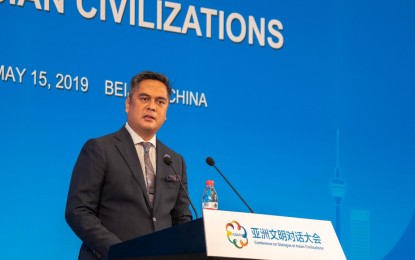
Presidential Communications Operations Office Secretary Martin Andanar delivers speech in a parallel forum during the Conference on Dialogue of Asian Civilizations (CDAC) held in Beijing on Wednesday, May 15, 2019. Andanar underscored the capability of Asian countries to uphold their own values amid influences from the West. (PNA photo)
BEIJING – Presidential Communications Operations Office (PCOO) Secretary Martin Andanar on Wednesday highlighted the capability of Asian countries to uphold their own values amid influences from the West.
In a parallel forum during the Conference on Dialogue of Asian Civilizations (CDAC) here, Andanar said even if most Asian countries experienced Western domination in the past, Asians were able to marry Eastern and Western cultures and make it part of the region’s civilization.
He added that the Philippines has its own form of writing, dances, natural instruments, and ancient legal codes from the ancient Maragtas and Kalantiaw even before it was colonized by the Spaniards for three centuries and more than four decades under the rule of the United States.
The Philippines also experienced Japanese occupation during the World War II.
The Philippine government today, he said, has implemented an independent foreign policy by strengthening its diplomatic relations with the East while maintaining its ties with the West.
“Our President, Rodrigo Roa Duterte, implemented an independent foreign policy upon his assumption into office. Our diplomatic relations with Russia and China were established in the mid-70s, and this is now being pursued aggressively, with the intent to strengthen the bond of friendship with our Asian neighbors,” he said.
“We have crossed the ideological barriers that divided the world between communism and democracy, and maintained our historical and contemporary alliance with the United States of America. The West is within our gates, but Asia now walks on our streets,” he added.
The Philippines, like other countries in Asia, can trace historical colonization from Western powers, he noted.
“We may have had episodes of Western domination over our land and natural resources for many centuries even, but our people know… that the thread of culture weaves through time and territories, connecting people and places, with the power of ideas and dreams,” Andanar said.
The dialogue between the East and the West, he said, has moved to a different level. We now approach the West with a refreshed sense of the mutuality of our cultures.
“We do not intend to make excuses for the past, neither would we obliterate it. It is now the foundation step towards the doors we open to world,” he added.
He also noted that the East and West share common heritage, and this should lead the world to the advancement and new discoveries of technology for further development and progress benefitting mankind.
Belt and Road as dialectical platform
Andanar cited the role of China’s ambitious Belt and Road Initiative (BRI) in propagating the global influence of Asian civilizations.
“As the Silk Road was, for many centuries in antiquity, the economic highway of the places traversed by the overland and maritime routes, the One Belt One Road program is now the dialectical relationship, between the economic and civilization development in Asia,” Andanar said.
He added that the narratives of the interchange of ideas, were also the stories of the cultures, carried in the packs of products and goods, that were bartered along the way.
Nearly 40 world leaders, including President Rodrigo Duterte, attended last month’s 2nd Belt and Road Form for International Cooperation in Beijing where Chinese President Xi Jinping declared China’s commitment to bolster the BRI’s long-term sustainability.
Xi proposed the BRI in October 2013 to connect Asia with Africa and Europe via land and maritime networks to pursue greater cooperation through infrastructure and financial investment as well as people-to-people and cultural exchanges.
Meanwhile, Xi led the opening of CDAC on Tuesday.
In his speech, Xi said CDAC aims to create a platform for dialogue in strengthening civilizations in Asia.
He added that people-to-people exchange will bridge cultural learning and boost cooperation among Asian nations. (PNA)
